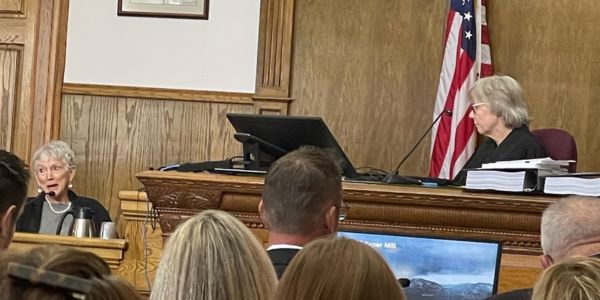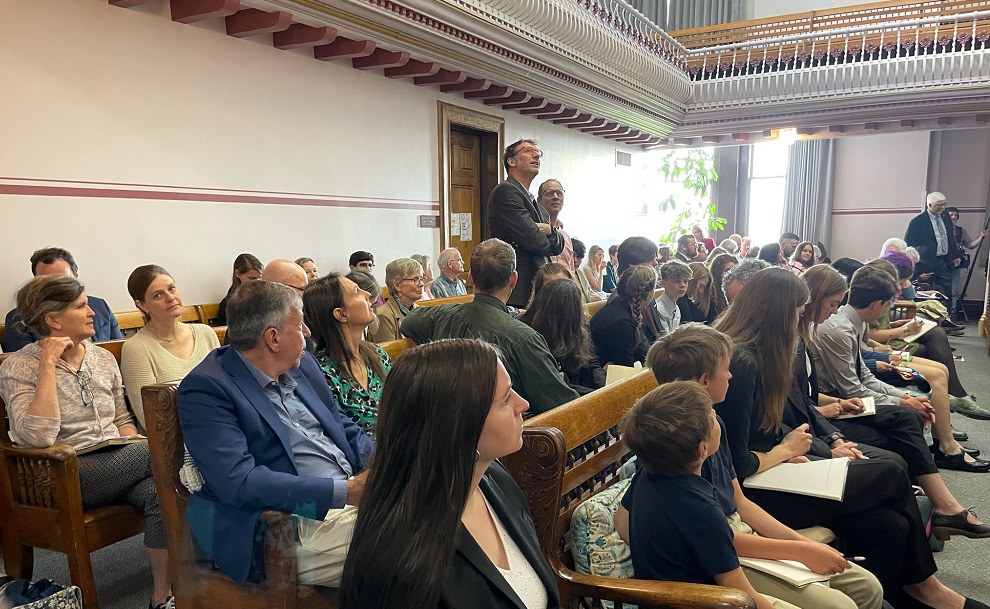Green Amendments For the Generations is on the ground in Helena, MT to attend the landmark Held v. State of Montana trial. Held v. State of Montana is a constitutional climate lawsuit brought by 16 Montana youth against their State to protect their equal rights to a healthy environment, life, dignity, and freedom. They are suing because their government continues to support fossil fuel use, which is exacerbating the climate crisis and threatening the youths’ futures. Montana is 1 of only 3 states that recognize a right of all people in the state to a clean, safe and healthy environment in the form of a constitutional Green Amendment.
The Held v. Montana litigation is the first time the right to a safe climate is getting a full and fair hearing in the courts with a state Green Amendment as a key foundation.
The work of Our Children’s Trust (a non-profit public interest law firm that provides legal services to youth to secure their legal rights to a safe climate) to enforce the environmental rights of future generations, and the work of Green Amendments For The Generations, are two complementary efforts that are transforming the environmental protection legal landscape from a system defined entirely by state and federal legislatures, to a system where the ultimate entitlement and right lies with the people.
GAFTG Founder Maya van Rossum is currently in Montana giving live coverage of the trial from her perspective as a national expert on constitutional environmental rights. Read her breakdown of the most poignant moments in the courtroom from the first day of the trial (and follow her on Twitter for live coverage of what’s happening):
DAY ONE of Held v. State of Montana held some powerful moments and, to me, a surprising but not so surprising line of state defense.
The attorneys for Our Children’s Trust and the Western Environmental Law Center were masterful and presented a very effective case. The opening statement laid out the case, experts, and witnesses to come. It was, as I wrote it down, put forth this simple truth about the legal case to be argued: In sum, this case is about the equal rights of children to be protected from the extraordinary harms of the climate crisis.
The Montana Green Amendment’s promise of a right to a clean and healthful environment was clearly the cornerstone for the legal arguments to come.
The state followed with a short and relatively curt opening of its own (as I wrote it down): “In reality, the substance of this case is far more boring than the plaintiffs would suggest.” And then went on to talk legalese and to suggest that there was no relief the court could grant that would redress the plaintiff’s concerns about the state’s contributions to the climate crisis.
The dismissiveness of the impacts of the climate crisis on the youth plaintiffs sitting in the court was stark and striking. Particularly as it compared to the science-based, fact-based, emotion-based and reality-based presentation of the attorneys representing the youth plaintiffs.
As I sat there it seemed clear to me, the state was unwilling to recognize the constitutional duties the Montana Green Amendment instilled in them: i.e. to ensure their actions support, and do not infringe upon, the constitutional entitlement of all Montanans to a clean and healthful environment. The Montana Green Amendment does not speak to the actions of the rest of the world, it speaks to the actions of Montana government officials.
Three youth testifiers were brought to the stand this first day: Rikki Held, Grace Gibson-Snyder, and Eva Livingston. Each of these strong young voices delivered powerful testimony about how growing wildfires, drought, heat and changing environmental conditions was impacting their lives. Rikki’s family ranch and motel business was being harmed, Grace was unable to enjoy soccer and the simple pleasures of young life for the burden that pollution and climate-worry brought to her life, and Eva’s daily connection with the Yellowstone River was impacted by fish kills and floods. The emotions the climate crisis instilled into their daily lives was sad to hear: fear, frustration, worry, vulnerable, scared. Grace wondered out loud if it would be moral or ethical to have children of her own for fear of the suffering climate change would inflict on their lives.

Mae Nan Ellingson was a powerful early witness for the day. Mae was 1 of the 100 delegates that crafted and passed the 1972 Montana state constitution which included the state’s powerful Green Amendment language:
Article II, Declaration of Rights § 3 Inalienable rights.
All persons are born free and have certain inalienable rights. They include the right to a clean and healthful environment and the rights of pursuing life’s basic necessities, enjoying and defending their lives and liberties, acquiring, possessing and protecting property, and seeking their safety, health and happiness in all lawful ways. In enjoying these rights, all persons recognize corresponding responsibilities.
Article IX, Environment and Natural Resources § 1 Protection and improvement.
(1) The state and each person shall maintain and improve a clean and healthful environment in Montana for present and future generations.
Mae spoke of being 1 of only 9 delegates still alive to attest to the importance of including the environmental right in the constitution and how important it was to recognize the connection between the people and the lands of Montana.

Dr. Steven Running was the main testifier of the day. Dr. Running is a nationally and internationally recognized expert on climate change, including being among the scientists serving on the Intergovernmental Panel on Climate Change that was awarded the 2007 Nobel Peace Prize for assessing and presenting the science of climate change. His testimony was compelling, disturbing and persuasive all at the same time. And Dr. Running had a wonderful way to introduce levity into the day that had those present enjoying a brief moment of laughter while taking in the deeply concerning power of the science and facts he was delivering.
It was disturbing to hear Dr. Running tell Judge Kathy Seeley – who remained fully attentive and engaged throughout the entire day – that in 1958, our world was at 316 ppm of CO2 in the atmosphere, that today we are at 425 ppm, and that the level scientists say we need to get back to in order to re-stabilize the climate is 350 ppm. Dr. Running made clear, the main culprit of this increase in climate destabilizing emissions? Fossil fuels.
What I found so hopeful about Dr. Running’s testimony, as hard as it was to hear him recount the many ways the climate crisis was inflicting devastating harm on people, water, lands, ecosystems, trees, plants and wildlife – he made the following two points (I think I caught these quotes exactly):
- Suggesting that it was not all that long ago, Dr. Running said “In 1988 we were at 350 ppm atmospheric CO2, so it is well within our capability to get there.”
- “We have to change the trajectory of emissions. We should have done it decades ago. But the next best thing is to do it now.”
It was a powerful day of emotion, science, facts and law. Throughout the day you could hear a pin drop, except when Dr. Running was giving us all a laugh. And so I will end this piece with one of those moments.
Dr. Running has just offered a statement that Pika and Marmot (little furry mammals) in Glacier National Park need snowpack for their successful life cycle. The loss of snowpack due to climate change was impacting their ability to survive, thrive and procreate. The state interjected: “We Object!” We don’t believe that Dr. Running is an expert ecologist with expertise in this area.
The room was silent for a moment. But just a moment. Until Dr. Running leaned into his microphone at the witness stand and said: “I was a coauthor on this paper.”
The whole courtroom erupted in laughter!
It was a good day for the Youth Plaintiffs, Our Children’s Trust, and the Western Environmental Law Center.
It was also a good day for making the point that constitutional Green Amendment language brings powerful and transformational protection for our environment, all people and all of nature.



